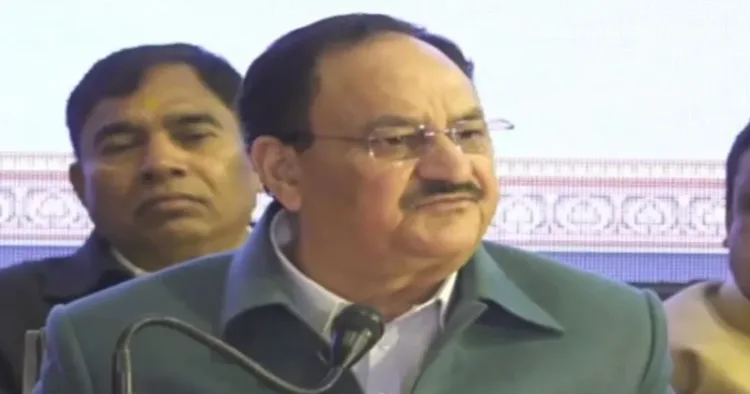Ahead of the Delhi Assembly Elections 2025, BJP National President JP Nadda launched the party’s manifesto, titled “Sankalp Patra Part-I,” at the BJP State Office. The manifesto outlines a comprehensive roadmap aimed at transforming Delhi into a developed state with a focus on transparent governance, strengthened welfare schemes, and anti-corruption measures.
JP Nadda emphasised the BJP’s commitment to maintaining and strengthening existing welfare schemes, ensuring effective implementation free from corruption. “Our promise is a guarantee of fulfillment, as demonstrated by BJP’s track record at the national and state levels,” he stated. Nadda highlighted that initiatives such as the Ayushman Bharat scheme, currently stalled under the AAP government, will be implemented in Delhi with an additional health cover of Rs 5 lakh, bringing the total coverage to Rs 10 lakh for Delhi residents.
The manifesto unveiled targeted measures for women’s welfare under the Mahila Samridhi Yojana, including a monthly stipend of Rs 2,500 for women and subsidies on LPG cylinders. Additionally, pregnant women will receive Rs 21,000 and six nutrition kits under the revamped Matru Suraksha Vandana scheme.
Senior citizens will also benefit from enhanced pension plans. Individuals aged 60–70 years will see pensions increased from Rs 2,000 to Rs 2,500, while those over 70 years and destitute women will receive Rs 3,000.
Inspired by successful models in Haryana and Rajasthan, the BJP has pledged to launch the Atal Canteen Scheme, offering full meals for Rs 5 in Delhi’s slum clusters. This initiative seeks to address food insecurity, contrasting it with the unfulfilled promise of 100 Aam Aadmi Canteens by the AAP government in 2015.
Nadda launched scathing attacks on the AAP government, accusing it of rampant corruption, particularly in the much-touted mohalla clinic initiative. Alleging fraudulent lab tests and a Rs 300 crore scam, he assured thorough investigations and reforms in healthcare delivery systems.
Highlighting the participatory approach to formulating the manifesto, Nadda revealed that the BJP had conducted over 12,000 meetings and received approximately 1.8 lakh feedback submissions. “This is not just a manifesto; it is a resolution letter, a pledge to move from resolve to accomplishment,” he said, attributing the inspiration for this governance model to Prime Minister Narendra Modi.
The manifesto also criticised the AAP government for failing to deliver on key promises, such as providing a monthly allowance of Rs 2,100 in 2021 and Rs 1,000 in 2024, subsidies on LPG, and functional canteens for the poor. Nadda asserted that these unmet commitments highlight the need for a leadership change in Delhi.
The BJP’s vision, as articulated in the “Sankalp Patra Part-I,” encompasses good governance, upliftment of the poor, women’s empowerment, and youth development. Nadda underscored the BJP’s broader success in governance, citing NITI Aayog data revealing that 25 crore Indians have been lifted out of poverty under BJP-led initiatives.
Earlier, BJP on January 16, released its fourth list of nine candidates for the polls, thus declaring 68 of the 70 names, leaving two seats for its allies. Party has allocated two seats to its National Democratic Alliance (NDA) allies, Nitish Kumar’s Janata Dal (United) and Chirag Paswan’s Lok Janshakti Party (Ram Vilas). While JD(U) will contest from the Burari seat, LJP will fight the poll from the Deoli assembly seat.
Notably, JD(U) has announced Shailendra Kumar as its candidate from Burari, the LJP (RV) is likely to field a candidate from Deoli. Both the JD(U) and LJP (Ram Vilas), with a stronghold in Bihar that goes to polls this year, are key partners in the BJP-NDA.
The BJP fielded some of its heavyweights in the fray, including Dushyant Gautam from Karol Bagh, Manjinder Singh Sirsa from Rajouri Garden, and former Delhi Congress chief Arvinder Singh Lovely from Gandhi Nagar. Parvesh Verma, a former MP and son of former Delhi CM Sahib Singh Verma, will give fight to Kejriwal on the New Delhi seat.
Congress has fielded Sandeep Dikshit, son of former Delhi Chief Minister Shiela Dikshit from the seat. BJP has fielded its former MP Ramesh Bidhuri from Kalkaji against Atishi.
A three-way contest is on the cards in Delhi between the ruling AAP, BJP and Congress. Congress, which was in power for 15 consecutive years in Delhi, has suffered setbacks in the last two assembly elections and has failed to win any seat.
AAP dominated the 2020 assembly elections by winning 62 out of 70 seats while the BJP got eight seats. The Congress had already declared 68 candidates out of Delhi’s 70 assembly seats. The ruling AAP has already declared its candidates for all 70 seats.
The last date for filing nominations is January 17. The date for scrutiny of nominations is January 18. The last date for withdrawal of candidature is January 20. Delhi assembly polls will be held in a single phase on February 5 and the counting of votes will take place on February 8.



















Comments